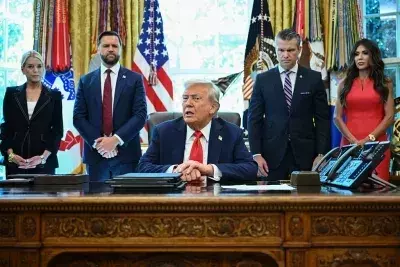
Navigating the Tensions of Federal Intervention and Municipal Sovereignty
Presidential Directives on Law Enforcement and the National Guard's Evolving Role
On a recent Monday, the former President asserted the federal government's readiness to deploy military forces, specifically the National Guard, to any city grappling with high crime rates, even in the absence of a direct request from state governors. This declaration coincided with the signing of a pivotal executive order. This order aimed to establish a specialized National Guard contingent, primarily intended for deployment in Washington, D.C., to aid local law enforcement. However, its broader scope suggested potential applications across the nation for managing civil unrest and upholding public order when circumstances demand.
The Chicago Conundrum: A Shifting Stance on Federal Deployment
While the former President had previously indicated Chicago as a potential target for federal intervention against surging crime, his position on Monday appeared to waver. He expressed a preference for invitations from local authorities, stating his reluctance to intervene without such a request, especially given concerns about potentially adversarial relationships with local political figures. The President explicitly mentioned the lack of an official appeal from Illinois' governor, implying that no federal action would be taken in Chicago until such a request was made.
Chicago's Mayor Responds: A Stance Against Unsolicited Federal Presence
In a preemptive move, Chicago's Democratic Mayor, Brandon Johnson, voiced strong opposition to any unsolicited federal military deployment in his city. He characterized such an act as unconstitutional and profoundly undemocratic, firmly stating that Chicago had no intention of inviting American troops to occupy its streets. The Mayor also confirmed that his administration had received no direct communication from the White House regarding a potential deployment, reinforcing the city's position against federal overreach.
